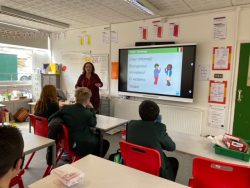Shakespeare Week: Writing Sonnets
During Shakespeare Week, all of KS3 took part in a special lesson on Shakespearean sonnets. We learnt about Sonnet 130 and how to write using parody. We were allowed to write...
Filter by Category
Filter by Author


























































































































































































During Shakespeare Week, all of KS3 took part in a special lesson on Shakespearean sonnets. We learnt about Sonnet 130 and how to write using parody. We were allowed to write...
Posted by Natalie Stanton

This STEM challenge involves building a lava lamp. Let’s see if we can get some great BMS made lava lamps pics or videos to feature in a future newsletter! Looking for some...
Posted by Suresh Varsani

As lockdown is easing, we are excited to now have the opportunity to start up again some of our STEM clubs. This Thursday and Friday saw the launch of the Year 7 and 8 lunchtime...
Posted by Suresh Varsani

Today, Monday 12th April 2021, I attended the new Italian lunchtime Club. It was really fun and we learned some Italian greetings such as ‘ciao’, ‘grazie’, ‘ci vediamo’ and ‘mi...
Posted by Hilarie Charles

During Flair week, alongside guests, students showed their flair and engagement through the completion of independent projects on an area of interest, presented in writing or...
Posted by Stephanie Knowles

15/3/21 Owen Thomas 12 Ash Owen has settled back into school very well. He is enjoying his lessons and working very hard in all his subjects. Owen is our Senior Librarian who...
Posted by Des Timotheou

Flair week saw a range of different activities in the Humanities and Social Sciences faculty, we saw many students enthusiastically take part and show off their abilities and...
Posted by Richard Dowty

Our year 12 art students have been producing some wonderful work on the theme of Structures. Gabriela has produced a triptych of portraits using a variety of materials such as oil...
Posted by Kate Hoskins

Our Sixth Form provides students with a personalised and rounded education. We provide our students with access to a full range of opportunities and our courses aim to equip...
Posted by Claire Till

During the recent Easter holidays it was inspiring to receive this email from Rosalyn Graham one of the leaders and co-founder of Community Angels. Our Sixth Formers continue to...
Posted by Jeremy Turner
During Shakespeare Week, all of KS3 took part in a special lesson on Shakespearean sonnets. We learnt about Sonnet 130 and how to write using parody. We were allowed to write about any topic we would like whether it was a favourite movie, or your pet!
Personally, I wrote about Halo (a favourite game of mine), and some parts that slightly annoy me about it, but making sure to exaggerate it, something which is key when you are trying to use parody in a piece and making sure to follow the structure of Sonnet 130.
I found it quite interesting learning about parodies, and how they were written, making fun of something, and pointing out its flaws, but making sure it was silly enough to not seem too serious.
I did find it quite challenging to try and make sure that each line stayed within 10 syllables (something that is key when writing a sonnet), but I believe that part of the enjoyment in writing the sonnet was in finding the correct combination of words, to both get your point across and make sure it sticks to the criteria.
Overall, I really enjoyed the lesson, learning about the style of parody, and the highlight of getting to create our own sonnet about whatever we pleased was a great experience.
Below is a showcase of some of the sonnets written by Bushey Meads students. Well done everyone!
By Darius Oprea, 9 Elm

Banned Books Week: The Power of Unsilenced Voices This week (October 1st – October 7th) we celebrate Banned Books Week, an annual event that champions the freedom to read. It’s a...

This week it has been a real privilege to observe some of our outstanding Learning Assistants in action in classrooms across the school as they support the teachers and of course...